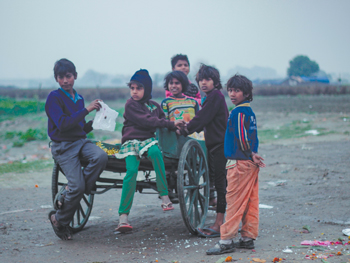 How about these for some eye-popping numbers?
How about these for some eye-popping numbers?There are apparently 2,153 billionaires — yes, with a b — in the world who have the same collective worth as the poorest half of the world. Put another way, these 2,153 vastly privileged people have the same collective wealth as 4.6 billion — yes, with a b — poor people. And, who is the richest person in the world? He is Jeff Bezos, founder of Amazon, and his estimated worth is $131 billion, almost six times North Carolina’s annual budget at one man’s disposal. Bill Gates is No. 2 at $96 billion, followed by Warren Buffett at $83 billion. Donald Trump comes in at a mere $3 billion. Much of that wealth has come from exploding technology and financial sectors. The report also finds that 22 men have more wealth than Africa’s 326 million women combined.
Oxfam, a group of 19 independent charitable organizations focused on reducing global poverty, issues an annual report on who holds the world’s wealth. The report, issued to coincide with this month’s gathering of the ultra-rich at the World Economic Forum in Davos, Switzerland, is based on data from the Credit Suisse Global Wealth Report, an outfit that has a good handle on where the money is. More than a few observers see the irony in rich people flying in on their private jets to discuss world poverty, among other issues. The Oxfam report is full of economic statistics that can be sliced and diced in all sorts of ways, not all of them positive.
The World Economic Forum also expands the elite billionaire category to the richest multi-millionaires, which means the top 1% of the world’s wealth holders have twice as much collective wealth as almost seven billion people. One way to visualize the disparity of this inequality is to imagine that if we all sat on our wealth in $100 bills, most of us would sitting on the floor. Middle class folks from a wealthy nation, say most Americans, would be sitting at chair height. The world’s two richest men, Bezos and Gates, would be sitting in space.
One aspect of world poverty and global inequity is that women put in literally billions of unpaid, undervalued work around the world, at least 12.5 billion hours adding almost $11 trillion — yes, with a t — to the world economy every year. This work includes women who walk miles to get water for their families, providing cooking, child-minding and other care work that is undervalued and generally unpaid, keeping the women in poverty and generating massive wealth for others.
In general, the rich get richer and the poor either stay the same or get poorer. Money makes money through investing — hence more billionaires, most of them Americans, but workers do not have enough money to make it work for them. Oxfam reports that while the poorest of the poor are making some progress worldwide, nearly half the world’s population lives on less than $5.50 a day.
“Extreme wealth is a sign of a failing economic system,” says the Oxfam report. Still, no one is realistically advocating snagging billions from the big-time “haves” of the world, much less from you and me. But Oxfam does have some suggestions to right the distortions that allow a few to accumulate vast wealth while most people struggle.
1. Deliver universal health care, education and other public services to all, including women and girls. Limit or end privatization of public services.
2. Invest in public services that allow women to move from daily hours of unpaid care services into actual employment.
3. End the under taxation of wealthy individuals and corporations that now pay lower rates than middle-class individuals. Eliminate tax avoidance and evasion by the super-rich and corporations.
It took decades to get to such economic unbalance, and it will take decades to right our worldwide economic ship. What has occurred and how to deal with it is well worth pondering as we surf the internet with our fingers hovering over “Buy Now” on the Amazon website.

 How to resolve AdBlock issue?
How to resolve AdBlock issue? 









